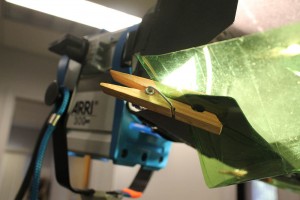Background information:
My informant is a theatre major from New Jersey, now living and studying in Southern California. She has told me about many superstitions from the theatre and film world, and this particular one is about the ‘ghost light’ that must be on all sets. There are two reasons for having this light, a practical and a superstitious meaning. I have physically seen this light on one of the sound stages in Warner Brothers studios in Burbank, where the guide concurred with what my friend told me about ghost lights. She doesn’t believe in this superstition, and finds it a little creepy when working late at night when this is the only light on. She is signified in this conversation by the initials B.I.
Main piece:
B.I.: Basically ghost lights are a kind of bare bulb light, usually, which is left on all the time on a set or in a theatre. They’re a bare bulb lighting in a metal frame, in a tall stand. They serve two purposes. Practically, they’re for lighting up a stage or a sound stage out of hours as normally there would be no lights on if a person was working out of hours. The second reason is more superstitious. They say that the ghosts of the stories haunt the sound stages and the theatres, I don’t know if they’re literal ghosts or metaphorical ones, and that the light drives them out. It’s said that all theatres and sets have ghosts, and sometimes people say that having the one light on allows for the ghosts to perform on the stage out of hours, so they’re not unhappy with the living and leave the actual performances themselves alone.
Performance Context:
This piece of folklore was related to me in a larger conversation about film and theatre superstitions, in which she related to me the superstitions about “The Scottish Play.” I asked about this superstition in particular after seeing a ghost light on set on a tour of Warner Brother in Burbank.
My thoughts:
It seems that the entertainment industry is very focused on superstition. This seems to me to stem partly from the insecurity of success in film and theatre, and the ability to be famous one day and ruined the next. Whilst these are standard facets of the industry, these kinds of superstitions act as a kind of regulating influence, a way for humans to control both their personal fate, and in general the uncontrollable. Overall, one could see most forms of mythology and legend as ways of putting order on those things which are physically unknowable by humans. The idea here that it may be the ghost of a particular performance locates the tale very clearly in the film/theatre world, yet the practical usage of the light as a way for people working out of hours to see both legitimizes those working under the guise of needing light, but believing in the superstition, and actually allows them to get work done. As many sound stages sets in particular do not have overhead lighting, as light is normally moved around during the production, the presence of one stable light allows people to work out of hours without having to interfere with the set.

